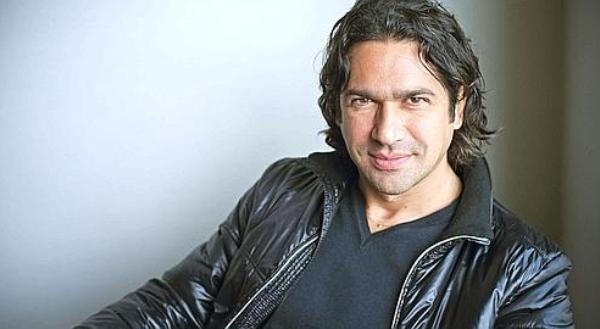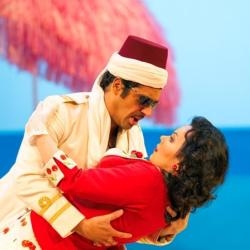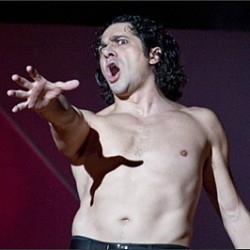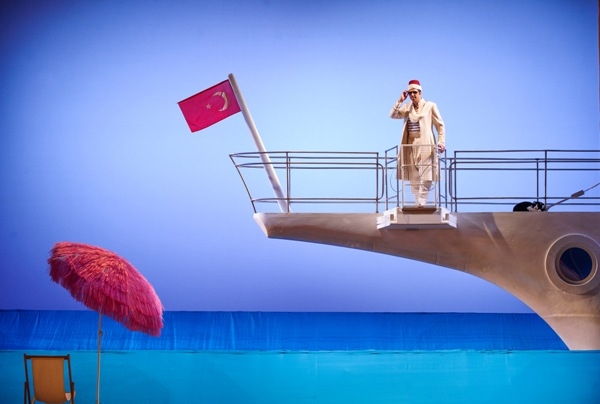Ildebrando D'Arcangelo – 'An opera singer is like a priest'

Mellifluously gifted and impossibly good-looking, the Italian bass (not bass-baritone – more on that later) Ildebrando D'Arcangelo is back in London to recreate the role of Selim in Rossini's comedy Il turco in Italia.
What do you most enjoy about playing the dashing Turk Selim?
Rossini wrote some great arias for the bass in operas like Semiramide and Maometto II, but there aren’t really any in Il turco so the pleasure for me is in playing the comedy. And I get to sing alongside Alessandro Corbelli, who’s the best! I have to try to measure up to him, but at the same time I have to be different because I'm playing the only non-Italian character.
You’re returning to a role you first played here ten years ago. Is it a strange feeling to come back?
No, it feels like it was yesterday, because this time the cast is the same except that now we have Aleksandra Kurzak instead of Cecilia Bartoli; and I also sang the part with Aleksandra in an earlier revival anyway. As an opera singer you sometimes don’t see a colleague for ten years and when you do it’s as if no time has passed.
Are you working on this revival with Moshe Leiser and Patrice Caurier, the original directors?

© Clive Barda
Yes, they’re here. We’ve already rehearsed together for several weeks and it’s like the first time. They have so much energy and I appreciate that, even though it can be hard. On those occasions when you put together a revival in three or four days you miss something. Here it’s beautiful to have them with us because we can really breathe that hard work we did ten years ago.
It can be hard to make operatic comedy work for an audience. What makes this one so successful?
I think it’s the simplicity. Moshe and Patrice really try to create an authentic Italian style. They’ve done a great job of building their idea of 1950s Italy: there’s nothing illogical: it’s simple like a picture of everyday life. My character is the only one who’s different.
How to you feel when operas are moved into a time different from the one their composers intended? Are you comfortable with that?
When it’s logical and the director doesn’t fight with the composer but respects the mood of the music, then I can really appreciate it. Ten years ago I was more difficult about modern stuff, but now – maybe it’s the stage, maybe it’s the life – my vision of that has changed.
For a long time you sang Leporello in Mozart’s Don Giovanni; now you sing the Don himself. That’s a role we have not heard you sing in London.

© Marcus Lieberenz
No, not yet, sadly. I’ll be singing it for the Royal Opera in Japan [in the Kasper Holten production] and one day I hope I’ll get to sing it in London. I’ve sung it in all the big houses but not yet at Covent Garden.
You’re one of the ‘barihunks’, as they’re called on social media. It’s a light-hearted compliment, but you’re a very handsome man. Are looks important in today’s competitive world?
Yes, unfortunately I think they do seem to matter today. I really concentrate on the voice because opera is about singing first, and only then maybe the ‘beef-roll’… The main thing for me is to keep my belly in the right position, otherwise I won’t be able to sing Don Giovanni anymore and I’ll have to go back to Leporello!
I never classify my voice as bass-baritone because that is just a new word for a bass. To me there are three kinds of bass: the deep bass, the cantabile bass and brillante bass. I think my voice is more in the cantabile category.
We associate you with Mozart and Rossini, but this summer you’re going to sing Méphistophélès in Gounod’s Faust.
I was due to sing it last year but unfortunately I was ill. Now, though, I have the chance to do it with the Deutsche Oper Berlin. But my real new direction is Verdi. I added Attila to my repertoire last year, and soon I’ll be singing in Simon Boccanegra with Leo Nucci and Barbara Frittoli. I need to move on before the belly comes out! I have been waiting to feel inside myself when was the right moment; well, I’m 45 years old now and it’s time to explore the new work.
How do you manage to cope with so much travelling and all that intense rehearsal and performance?
In the time of Piero Cappuccilli they travelled slowly by boat and rehearsed on the way, then toured America for 60 performances of the same music in every kind of city. Today you travel more quickly and you have to change immediately from, say, Mozart to Rossini. It’s a much faster life. This is the only difficult part of the job; you need to save energy and calculate everything carefully.
How often do you find time to go home and relax?
Not often enough, unfortunately, because my calendar is so full. I go there just to change my clothes and luggage and say hello to my family, then I start again. But that is how it has to be. An opera singer is like a priest: a priest loves God and we love the voice.
– Leiser & Caurier's production of Il turco in Italia runs in repertory at the Royal Opera House from 11-27 April











